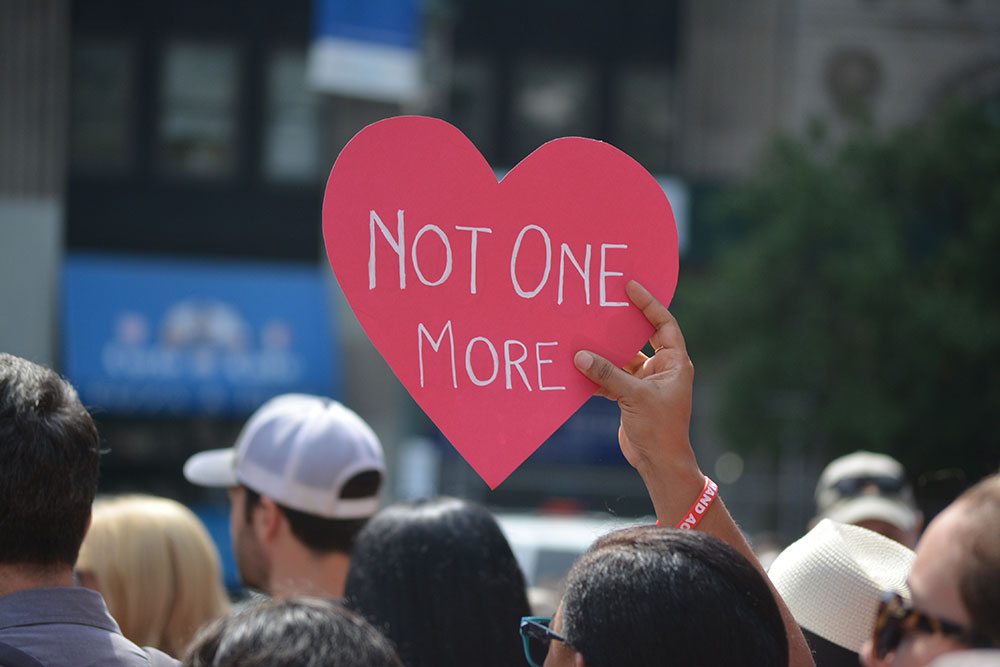The State of Mental Health in Parenthood

Maternal Mental Health Awareness Month is the perfect time to talk about the mental health struggles that often accompany parenting.
Expert: Kellie Wicklund, MA, LPC, PMH-C
Content Warning: This article mentions distressing themes such as suicide and assault.
If you’re in need of immediate help for your mental health, call the suicide and crisis lifeline by dialing 988.
At some point, the millennial generation became the target of all kinds of criticism. We’ve been hated on for being the recipients of participation trophies, for our love of avocado toast and dislike of flat sheets, and for our sense of entitlement to a living wage. Say what you will, but the one thing you can’t hate on us for is the fact that we are the generation that normalized going to therapy and sharing our mental health struggles. And it is because of our openness to talk about these topics we are aware of how parenthood affects our mental health—and how many of us feel like we’re drowning.
Maternal Mental Health Awareness Month is recognized each May, but for many of us parents, this observance is unnecessary because we experience the effects of the mental health crisis every day of our lives (and even if we aren’t struggling ourselves, there’s a good chance our kids are now or will in the future). Whether it’s coping with infertility, suffering from prenatal depression, navigating postpartum anxiety, trying to fight through fear of public spaces, teetering on the edge of burnout, or feeling out of control with rage, parents today are not OK.
Kellie Wicklund, MA, LPC, PMH-C, a licensed psychotherapist and owner and clinical director of Maternal Wellness Center in Hatboro, Pennsylvania, says she treats today’s parents for a variety of issues, including perinatal and postpartum mood and anxiety disorders, birth trauma, grief and loss, and mental health challenges related to infertility, rage, overwhelm, and burnout—and that’s just skimming the surface.
At Pregnancy & Newborn, we firmly believe in asking for help when struggling with your mental health. Parenting is hard enough on a good day, let alone when just getting out of bed feels like an impossible task. And we want you to know that you are not alone. In honor of Mental Health Awareness Month, here’s a non-exhaustive list and breakdowns of some of the common struggles parents experience, as well as some treatment options.
Prenatal Depression and Anxiety
For some reason, prenatal depression and anxiety aren’t talked about very often. Still, 10-25% of birthing parents experience symptoms of one or both at some point while expecting. You can start feeling symptoms of these at any point in your pregnancy, and every pregnant person is susceptible to these conditions; however, those with a history of mental illness or experiencing a complicated pregnancy are at higher risk.
Symptoms include excessive worrying, intrusive thoughts, changes in appetite, problems concentrating, fatigue or inability to sleep, feelings of sadness, decreased interest in things you usually enjoy, withdrawal from friends and family, mood swings, loss of interest in sex, and more. What’s difficult here is that many of these symptoms are also associated with pregnancy, but when they start getting in the way of daily life, it’s important to talk to your OB-GYN to determine if what you’re experiencing is a mood disorder. If your provider does diagnose you with prenatal depression or anxiety, therapy and certain medications are possible treatment options.
Postpartum Mood Disorders
Over the years, postpartum mood disorders have been given much more attention— for good reason! Around 85% of birthing parents will experience some kind of mood disturbance during the postpartum period, ranging from the normal “baby blues” (which doesn’t require treatment) to postpartum psychosis (the most severe postpartum mood disorder). Common postpartum diagnoses include:
- Postpartum depression
- Postpartum anxiety
- Postpartum obsessive-compulsive disorder (OCD)
- Postpartum post-traumatic stress syndrome (PTSD)
- Postpartum psychosis
Treatment options differ depending on diagnosis and severity. In some cases, a prescription for a low-dose anti-anxiety or antidepressant will be sufficient, while in others, you may need intense therapy and a combination of medications to see improvement. If you and your health care provider decide medication is the right option for you and you are breastfeeding, be sure to bring this up with your doctor so that they can try to find an option that’s safe to pass through breast milk.
Generalized Depression
Once your baby turns age 1, you’re officially out of the “postpartum” stage when it comes to a depression diagnosis. Postpartum depression can linger and transition into generalized depression, but this mental illness can strike at any time, whether your child is one year old or 12.
The World Health Organization (WHO) estimates that 280 million people worldwide experience depression. While we all feel down from time to time, feelings of depression differ because they “last most of the day, nearly every day, for at least two weeks,” according to the WHO. And it’s important to understand that depression isn’t just feeling sad (though sadness is certainly a symptom). In a depressive episode, you may also feel empty or numb, uninterested in activities or events, excessive guilt, and hopeless. You may also experience intrusive thoughts, changes in sleeping and eating patterns, and low energy. Prescription medications can help with feelings of depression, and psychological treatment is also typically recommended (such as talk therapy).
Generalized Anxiety
A recent survey found that, in 2022, 46% of moms said they were going to therapy, and 32% of those moms said it was to seek treatment for anxiety. In fact, anxiety disorders affect over 19% of the adult population in the United States, making anxiety one of the most common mental illnesses in our country.
Wicklund sees many parents suffering from anxiety, and given the stressors of parenthood today, she’s not surprised. “The current generation of parents grew up with the advent of the digital age, and they are really the first parents to have instant access to nearly infinite information about raising children,” she explains.
To make matters worse, the information found online is often conflicting—or outright false—making it all the more challenging to find the “right” answer. “Parents are digging through endless influencers without any real expertise or trying to wade through scientific papers without the experience to evaluate or truly understand them,” Wicklund says. Access to this information creates a perfect storm for parents struggling with anxiety, as “it can trigger spiraling or shame around their own decision-making.”
Symptoms of anxiety include feeling nervous, restless, or tense; having a sense of impending danger, panic, or doom; an increased heart rate, heavy breathing, sweating, trouble sleeping, trouble concentrating, gastrointestinal problems, excessive worry, and having the urge to avoid things that trigger anxiety. Treatment for anxiety typically includes prescription medication and therapy.
Burnout
Parental burnout is something that a lot of parents are teetering on the edge of regularly—if they’re not already experiencing it. Burnout is defined as “emotional exhaustion, depersonalization, and a decrease in self-fulfillment as a result of chronic exposure to an emotionally draining environment.” And if an “emotionally draining environment” doesn’t describe parenthood, then I don’t know what does.
A 2022 study found that 66% of working parents met the criteria for parental burnout, and in a 2023 report, 49% of moms reported feeling burned out by parenthood. Symptoms of parental burnout include overwhelming exhaustion (physical and/or emotional), chronic stress, distancing yourself from your kids, and a loss of fulfillment in parenting. Left untreated, burnout can lead to thoughts of escape and suicide, and child neglect or abuse.
Unfortunately, treatment for parental burnout isn’t as straightforward as other mental health conditions. A break from parenthood to reenergize can certainly help, but that’s not realistic for most parents. In that case, therapy and self-care are key in overcoming burnout; if you’re also experiencing feelings of depression or anxiety, you can talk to your provider about prescription medication treatment as well.
Loneliness
In May of 2023, the U.S. Surgeon General issued a report declaring loneliness an epidemic in our country. The report suggests a decline in social connectedness, smaller social networks, and a decrease in quality friendships (in 2021, 49% of adults reported having three or fewer close friends). This is a problem across the board, especially in parenting, since raising children “takes a village” and all.
A study published in 2021 reported that around one-third of parents experience chronic loneliness. The study found that parental loneliness differs from the general loneliness the rest of the population is experiencing and can have a lasting impact on the mental health of both the parent(s) and child(ren). Another study determined that many parents experience a decrease in the strength of a friendship after one or both individuals give birth to a child and that it isn’t until the youngest child is at least 5 years old that many parents start trying to reconnect with friends.
There is no magic prescription medication that can soothe the ache of loneliness (but antidepressants may be able to help when appropriate); it is something that has to be actively addressed. A good place to start is with a therapist who can help you talk and sort through your feelings, then help you come up with strategies for meeting and connecting with new people. This can be incredibly difficult as a parent, particularly when it comes to finding childcare, but professional support can help.
Rage
Often referred to as “mom rage” (though it can happen to any parent), these outbursts differ from general anger because they are often unexplained and leave the person feeling out of control. Episodes of parental rage typically leave the person feeling guilty, especially when the rage is directed at their child. When you’re experiencing rage, it can feel like it’s always there under the surface, waiting to emerge at the slightest trigger. It is equal parts scary, sad, and overwhelming.
Parental rage is a very real struggle that so many parents deal with, but it’s not actually an official diagnosis, and there isn’t much research on the condition yet. It’s something that can affect any parent, but those with a history of anger issues, depression, or anxiety are at a higher risk of experiencing it. It’s not uncommon for it to happen during the postpartum period, particularly when you’re sleep-deprived and just trying to survive daily life, but it can rear its ugly head long after postpartum as well.
As for treatment options, this is another struggle that often requires therapy and possibly medications (such as antidepressants, antianxiety drugs, or potentially mood stabilizers). A good therapist will help you develop solid coping strategies, identify triggers, and work on ways to manage other areas of your life that can contribute to your rage, like stress or sensory overload.
Social Anxiety
There is really no way to avoid the myriad of socialization accompanying parenting, such as playdates, school events, sports, birthday parties, and even family obligations. It’s a lot for even the most outgoing person to manage, but it’s particularly difficult for parents who struggle with social anxiety.
“Social anxiety in parenthood can be tricky because [playdates and gatherings are often] complicated social interactions,” explains Wicklund, “Parents are doing three complex tasks at once: actively parenting their child, actively attending to social interactions with another person, and also publicly parenting, which is its own vulnerable situation.” She also notes that these situations can be overstimulating for parents, “with a lot of noise and chaos,” which can add to the anxiety of the situation.
According to the Mayo Clinic, symptoms of social anxiety can include:
- Worry about embarrassing or humiliating yourself
- Fear of situations in which you may be judged negatively
- Anxiety in anticipation of a feared activity or event
- Avoidance of situations where you might be the center of attention
- Fear that others will notice that you look anxious
- Fear of interacting with or talking to strangers
- Fear of physical symptoms that may cause embarrassment, such as blushing, sweating, trembling, or having a shaky voice
- Analysis of your performance and identification of flaws in your interactions after a social situation
- Expectation of the worst possible consequences from a negative experience during a social situation
Wicklund says, “Often the anticipatory anxiety is worse than the actual event” for parents experiencing social anxiety, adding, “You might feel glad you’ve gone after you’re there.”
Still, treatment can help teach you how to cope with these feelings. Antianxiety medication may be an option, depending on your situation and the severity of your symptoms. Finding a therapist will be one of your best options, though, as a qualified provider will help you find the tools you need to manage social situations with more ease.

Fear of Public Spaces
Agoraphobia is an anxiety disorder that creates a fear of public spaces. However, this diagnosis is more generalized than what a lot of parents in America are experiencing. Today, so many of us are scared to go into crowds or public spaces for one particular (and terrifying) reason: Gun violence. And even though this fear is very real and widespread in our country, there is no formal name for this specific type of anxiety.
“As gun violence has increased to become the number one killer of children in America, it’s understandable that parents are feeling anxious about managing that risk,” says Wicklund. But while most of us still find a way to put on a smile and pretend we aren’t scared (if for no other reason than to shield our children from the realities of life in the U.S.), there is a point where the fear becomes a problem that requires intervention. “The benchmark for if something is dysfunctional is to ask ourselves if it is interfering with our activities of daily life,” Wicklund explains, “If yes, something needs to change.”
The most effective way to address this problem is with common sense gun laws that allow us all to feel safe in everyday life. But, since this solution is too far out of reach for our government, the best option we are left with is social anxiety treatment. In some cases, antianxiety medication can help, but therapy should definitely be part of your plan. A good therapist will help you talk through what you’re feeling, validate your feelings, and work with you to find ways to cope and manage your anxiety.
Finding a provider you connect with and who makes you feel safe is always essential. But in this case, since gun violence and ownership is such a hot-button topic, it is imperative to find a therapist whose personal or political views do not influence the care they provide.
Trauma
When many of us think of trauma and PTSD, we think of horrible situations like assault, abuse, war, a traumatic birth, losing a child, or witnessing a tragic event. These situations certainly deserve acknowledgment and treatment, but trauma is multifaceted, and many parents today might be trying to get through trauma without even realizing it.
“We’re coming out of a pandemic, and we are living with the after-effects of all that collective trauma—especially parents,” says Wicklund. “We’re starting to see the ripple effects of [the pandemic], but the real impacts won’t be visible until we have a little more distance. Much like we used to talk about how growing up in the depression affected our grandparents and great-grandparents, we will all likely feel the changes of living through the pandemic. But for parents, that impact will be two-fold—as they manage their own and their children’s responses.”
In addition to the pandemic, we are also being subjected to a critical shift in our human rights. Parents and children who identify as LGBTQ+ are under attack, with states across the country passing bills and laws that infringe on their civil and parental rights—particularly in the transgender community.
The Supreme Court’s decision to overturn Roe vs. Wade in 2022 is also traumatic in a number of ways. “It isn’t possible to say too much about the impact of restrictions on reproductive rights on maternal mental health right now,” stresses Wicklund. “The lack of access to medical abortion has profound impacts on the physical and mental health of people having children, and the threat of the lack of access to lifesaving care is a burden on all people of child-bearing age.”
So much upheaval has happened in such a short time, and many of us could unknowingly experience trauma responses. If that’s the case, talking to someone who can help is essential. A therapist can offer guidance and support as you navigate your feelings and learn how to cope with your symptoms of trauma. Additionally, if you’re experiencing depression or anxiety as a result of your trauma, prescription medication might be another treatment option.
Parents today have so much burden to carry. Between the state of the world—from politics to climate change, worries for our children’s futures, and the stress that comes with parenting in general, it’s understandable why many of us need support. If you are struggling with your mental health, remember that you are not alone, and help is available. The National Alliance on Mental Illness has resources available to help you learn more about mental health, find a provider in your area, and connect with group support.
This article has been updated since its original publishing in 2023.









